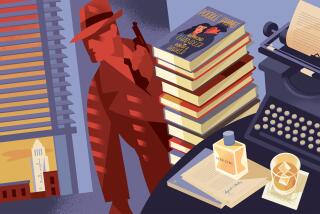Dark Passages: Dissecting the Detectives, Part 1
Note: This is the first of a two-part column on the current state of contemporary detective fiction. This month: series characters as viewed by their creators.
In an essay for the Wall Street Journal last spring, Alexander McCall Smith explains the curious relationship readers have with characters created by other people and the expectations that build up for authors as a result. He describes one encounter with a reader highly critical of a plot turn in one of his Isabel Dalhousie novels, to the point where McCall Smith muses, after the fact, “that was me put in my place. After all, I was merely the author.”
The phenomenon McCall Smith described -- best exemplified by the hordes of fans clamoring for any new speck of information on the next “Twilight” novel by Stephenie Meyer or the conclusion to the “Hunger Games” trilogy by Suzanne Collins -- is what I term narrative investment. The author creates a world whose story and characters ring so true and inspires readers to care a great deal about what happens next that they enter a fugue state mixing reality and fantasy -- with readers’ needs placed far ahead of writers’ -- especially if said stories are adapted for movies and television, expanding the narrative’s reach and cementing the level of investment by potential fans.
Though the larger world of science fiction, fantasy and comics attracts more fans with heavy emotional and wallet-based investments in their chosen genre, crime fiction is hardly immune. Last month’s column touched on what authors do when a series threatens to go stale, and some of their choices drive their readership into apoplexy -- especially when a beloved supporting or main player is disposed of. The total amount of time readers spend with a given series character, however, is dwarfed by the years of writing required to set each installment down on paper. And if writers don’t always know best about their detective alter-egos, they usually know better because they have access to inside information lurking inside their minds that readers simply do not.
“The Lineup: The World’s Greatest Crime Writers Tell the Inside Story of Their Greatest Detectives” (Little, Brown, 407 pp., $25.99), edited by Otto Penzler, is the natural bridge between authorial intention and reader demand. After all, who are more equipped to discourse on the origins, the motivations, the foibles and the triumphs of their life’s work (and the protagonists who embody said work) than some of the best-known and most successful mystery and thriller writers on the planet?
The project, Penzler explains in the book’s introduction, grew out of a need to save the Mysterious Bookshop, the independent mystery bookstore he has owned and run since 1979, from “bleeding money -- some months a mere trickle, others a rushing, roaring hemorrhage.” Moving downtown from its longtime location behind Manhattan’s Carnegie Hall to the Tribeca neighborhood robbed the store of precious walk-in traffic from the city’s affluent types. The new space, well-designed for browsing and evening events, also competes with a Barnes & Noble branch just two blocks away.
Penzler, a veteran anthologist and publisher, then hit upon a clever but simple idea: commission his author-friends to write autobiographical profiles of their series characters, which would be available -- free with a purchase or for a price in limited, collectible editions -- to the store’s customer base. The project will continue into a fourth year with the late Stuart Kaminsky writing of his first (of four) series protagonists, Toby Peters.
“The Lineup” collects 21 previously published profiles, and the assembled group, illustrious as it is, produces an overall result typical of anthologies. A surprising number of writers chose the meta-fictional path, from Jeffrey Deaver’s entertaining obituary of his quadriplegic forensic detective Lincoln Rhyme (but there’s a twist that, in typical Deaver fashion, upends reader expectations) and Laura Lippman’s newspaper-style feature on Tess Monaghan, to more straightforward short fictions by Robert B. Parker (on Spenser) and Anne Perry (on Charlotte and Thomas Pitt).
Q-&-As run rampant, be they fictional (Ridley Pearson’s police-style interrogation of Lou Boldt; a two-pronged interview by Douglas Preston & Lincoln Child about their enigmatic FBI agent hero Pendergast) as well as self-administered ones (Colin Dexter’s somewhat self-congratulatory effort on behalf of Inspector Morse, with a startling revelation he went agentless throughout his entire career).
The best pieces are the most essayistic, such as John Connolly’s thoughtful examination of how the seed of his series character, Charlie Parker, grew out of a still-unsolved murder in Ireland: “There was a kind of awful liberation, I thought, in having one’s worst nightmares come to pass,” Connolly writes of Parker, whom he wanted to remain human in the aftermath of losing everything he held dear.
Carol O’Connell admits right away that her main character, Mallory, is a sociopath, and if her traits are too uncomfortable, the author gleans insight from comments by the most deranged: “In my view, madness is a place. You go. You come back. And I think we all take turns being the mental patient. Without a touch of crazy, literature can be a desolate place.” And Lee Child, after cluing readers into the long gestation and nascent calculation required for hatching Jack Reacher, zeros in on the key psychological transaction between author and reader: “ ‘I’m the main character,’ the main character announces. The reader asks: ‘Am I going to like you?’ ”
Child’s answer, on behalf of Reacher, is dead-on: “ ‘You might or might not, and either way is fine with me.’ Because, as an author, I believe that kind of insouciant self-confidence builds a more enduring bond.” It goes back to what McCall Smith said about the enduring popularity of Tom Ripley, the sociopath featured in five novels by Patricia Highsmith: “Perhaps we merely want his story to continue because we are enjoying it so much.”
Ultimately, whether the reader or writer has the last word, “The Lineup” delineates the need for narrative investment to expand crime fiction’s entertainment-based capital into something that will endure for posterity.
Next time: In Part 2, P.D. James talks about detective fiction in a short book originally commissioned by the Bodleian Library.
Weinman blogs about crime and mystery fiction at www.sarahweinman.com. Dark Passages appears monthly at www.latimes.com/books.
More to Read
The biggest entertainment stories
Get our big stories about Hollywood, film, television, music, arts, culture and more right in your inbox as soon as they publish.
You may occasionally receive promotional content from the Los Angeles Times.






